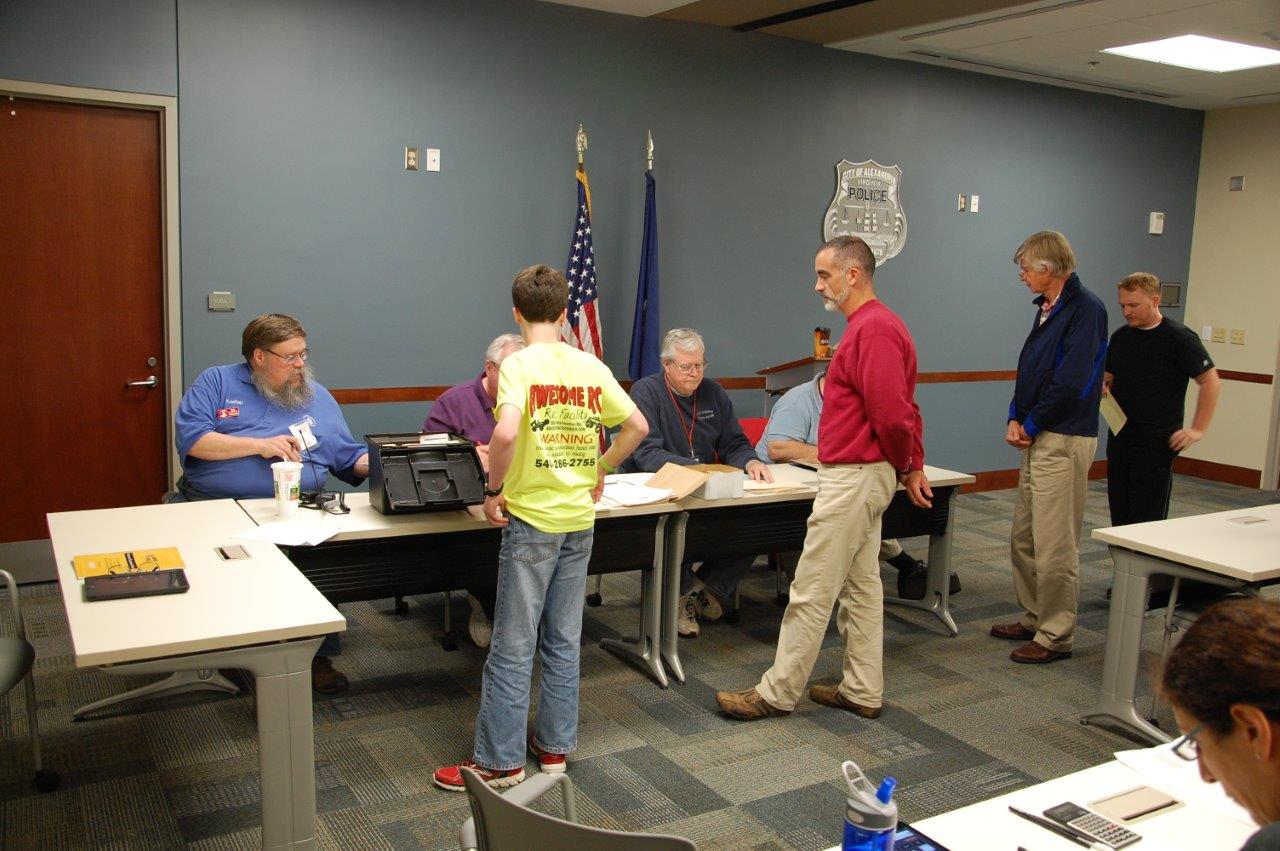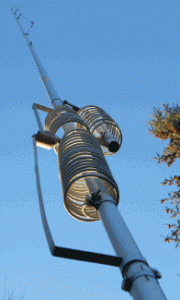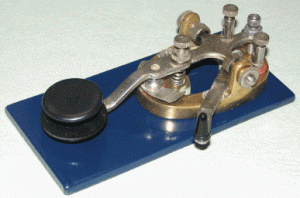ALEXANDRIA RADIO CLUB
FCC LICENSE SCHOOL
DIGITAL REGISTRATION FORM
(Spring 2026 Class Schedule)
First Class Date: Each Tuesday beginning March 3, 2026.
The required FCC Exam will be given on the last session on May 5, 2026.
Class Start Time: 1900 hours until 2100 hours (7:00 PM to 9:00 PM)
Teaching Site: via Zoom Meetings
Cost: There is no charge for the class itself. You will need to get an ARRL Technician License Manual (or General Class Manual if you already have a Technician License) for around $33 plus shipping. We highly recommend you purchase from the ARRL, see HRLM or GCLM, or a ham radio vendor like Ham Radio Outlet or DX Engineering so that you get the current edition of the manual. Amazon vendors do not always send the current edition. There is an ARRL exam fee of $15.00 payable by check or cash on the night of the exam.
Contact us at training@w4hfh.org for additional information or to register for the class. Your instructors are all Extra Class licensees and several have commercial FCC licenses. The FCC License Class Syllabus covers 400 question topics from which 35 pool questions make up the license exam. Classes incorporate ARRL PowerPoint Topics & Film Clips portraying the historical evolution of radio communications. License practice exam questions are available on the Internet. Learning International Morse Code is NOT an FCC license requirement, but is encouraged.
FCC Title 47 Telecommunications, Part 97 Amateur Radio Service
Your FCC Registration Number (FRN) You must have an FRN assigned prior to the exam.
Review of ARC License School
by Rich KA4GFY, Former Coordinator for Ham License Training
Facility instructor Rick Bunn asked me to review some of the training methods used to study for amateur radio license. I may be biased, but I think a class is by far the best way to do this, because you get the interaction with experienced hams that can help you with those tricky questions that always seem to come up. My philosophy is I would rather teach the student material so they have an understanding of what they need to know, rather than teaching the questions and the right answers to the questions. If you have ever wondered why our classes are spread over several weeks rather than a weekend or even a few weeks, now you know. As for the book, we use the ARRL’s Ham Radio License Manual, while other instructors use Gordon West’s book. Both are good books for the classroom.
For the student who doesn’t want to commit to one night a week for several weeks, there is the occasional weekend class. To put it mildly, this is like trying to take a drink from a fully charged fire hose. It’s a lot of information over two or even one day. I can’t imagine anyone learns much other than the questions and some of the right answers. Weekend courses require advance preparation by the student and a lot of preparation by the instructors. We tried it once and came to the conclusion the students didn’t get much out of it. In looking at the ARRL’s listing of classes, I find fewer and fewer classes being taught over one weekend. I am seeing some taught over a few weekends.
As with everything else these days, the internet is a place many people go to do their studying. ARRL has an on-line Technician class as part of their suite of continuing education courses. This class uses the Ham Radio License Manual, but the student is paired with a mentor, who is there to guide the student through the material and answer questions. There is no set day and time to meet, its all done via email. However, the student does have a set time limit to complete the class. If you have ever done any of the ARRL emergency communications courses, this is the same format, and it does work very well.
I periodically see a prospective ham showing up on some of the radio websites asking where/how they should get started on studying for a ham license. As you can imagine, the answers are as different as can be. Some people point them to the license class lookup section of the ARRL’s website and some are pointed to the multitude of on-line “study” websites. For the most part, these appear to be websites where they fire a bunch of questions at you and keep score. Some of the ones you pay real money for will keep track of your score and keep firing questions from your problem areas until you figure out the right answer by process of elimination. You don’t learn much, other than the questions and the right answer. You often don’t know why it’s the right answer. As you can tell, I am not a fan of these websites. They are fine as a supplement, i.e., a way to get some experience at seeing the questions and getting an idea of how you might do on the real test.
There is at least one class that is taught as a podcast. You can download this week’s class into your ipod or smartphone and listen in to the instructors go through the material. I don’t really know much about them, I don’t know anybody who has ever used one. Again, I don’t know how the student can ask questions to the instructor.
Not all formats work for every student. If you tried one format and it didn’t work, don’t give on on becoming a ham, try another. Getting a license has never been easier with the different study methods out there.
VE Team at testing sesion

Classes Offered
Technician:

The entry level for ham radio. Talk around town on a hand-held radio using “repeaters” provided by groups of fellow hams. That’s called “two meters” and “four-forty”. Talk regionally on “six meters” and “ten meters”; when propagation is good you can even get to the Caribbean! The test is 30 questions mostly about operating principles, the FCC rules, and enough technical information to connect the radio, pick the frequencies, and operate. This takes 10 weeks of two-hour classes and, depending on the student’s background, lots of study and sample test taking.
General:

Opens up world-wide communications. Talk around the world on most of the popular “HF bands” with as much antenna and power as you can afford! There’s a lot more to learn about electronics so there’s more technical material than in the Technician class. You have to pass the Technician test before you can take the General exam. The test is 30 questions with the operating principles and the FCC rules that fit international communications. And there’s more technical content. This takes 10 weeks of two-hour classes and, depending on the student’s background, lots of study and sample test taking.
Extra:
A license that allows the use of all the ham bands, especially those frequencies used in long-distance contests. It also qualifies you to become a license examiner for all levels. It’s pretty technical. You know your electronics and the formulas by the time you pass this test. The exam is 50questions dominated by technical content. You must have passed the Technician and General exams to take the Extra test. This takes 10 weeks of two-hour classes and, depending on the student’s background, lots of study and sample test taking.
Morse Code:

It’s now optional; it’s no longer required to get a General and higher license. Ironically it’s gaining popularity now that it’s optional! There are occasional meetings of the class and weekly code practice sessions on a radio net.
FCC License School Syllabus and Faculty Instructors:
Sample Syllabus – Actual Syllabus will be distributed to students on the first day of class
| Technician Class Syllabus | |
| First Session | Introduction Chapter 1 – Welcome to Amateur Radio |
| Second Session | Chapter 3 – Electricity, Components and Circuits |
| Third Session | Chapter 2 – Radio and Signal Fundamentals |
| Fourth Session | Chapter 4 – Propagation, Antennas and Feedlines |
| Fifth Session | Chapter 5 – Amateur Radio Equipment |
| Sixth Session | Chapter 6 – Communicating with Other Hams |
| Seventh Session | Chapter 7 – Licensing Regulations |
| Eight Session | Chapter 8 – Operating Regulations |
| Ninth Session | Chapter 9 – Operating Regulations |
| Tenth Session | Exam |
| General Class Syllabus | |
| First Session | Introduction Chapter 1 – General Class and Amateur Radio |
| Second Session | Chapter 2 – Procedures and Practices |
| Third Session | Chapter 3 – Rules and Regulations |
| Fourth Session | Chapter 4 – Components and Circuits |
| Fifth Session | Chapter 5 – Radio Signals and Equipment |
| Sixth Session | Chapter 6 – Digital Modes |
| Seventh Session | Chapter 7 – Antenna |
| Eight Session | Chapter 8 – Propagation |
| Ninth Session | Chapter 9 – Electrical and RF Safety |
| Tenth Session | Exam |
Instructors – Actual Instructors may vary per session
| Rich Adamy | KA4GFY | KA4GFY@arrl.net |
| Rich Bunn | N4ASX | N4ASX@arrl.net |
| Harry Jones | N4CWP | N4CWP@arrl.net |
| Ian Keith | N8IK | N8IK@arrl.net |
| Don Lewis | KI4D | KI4D@arrl.net |
| Bob Crumley | KO4ZIK | KO4ZIK@arrl.net |
| Richard Morani | KW4UJ | KW4UJ@arrl.net |

